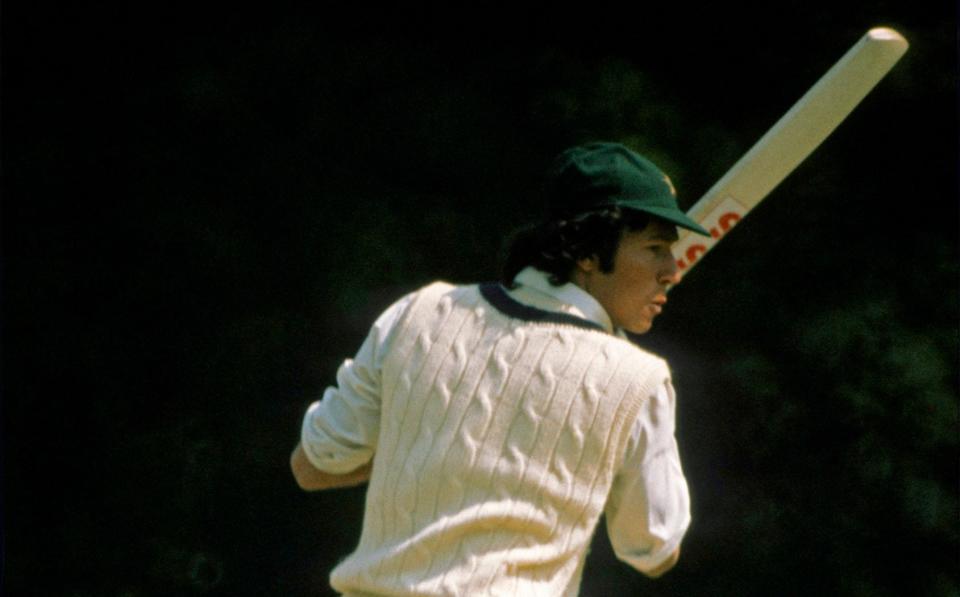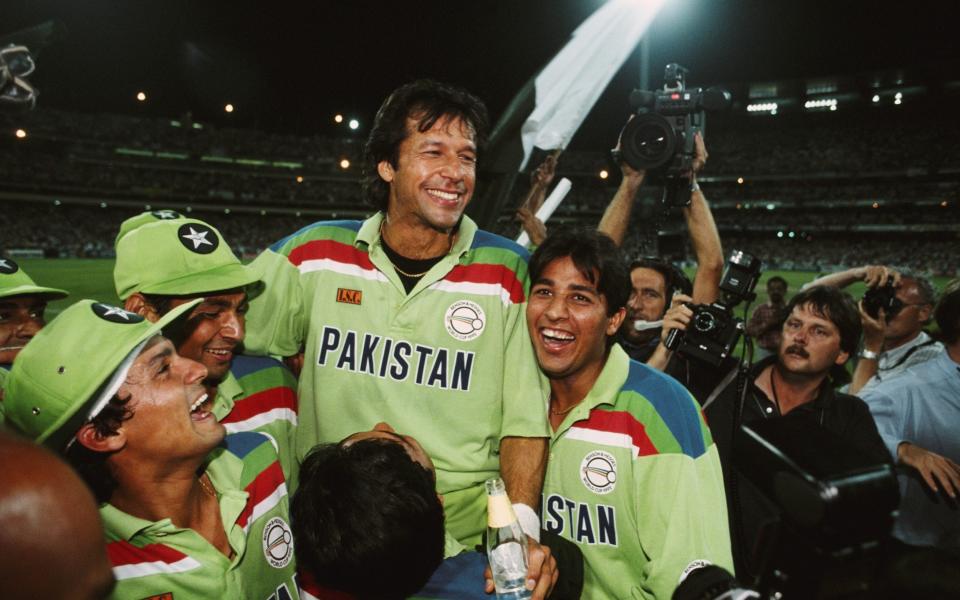Fifty years since Imran Khan’s golden county summer – and now he is languishing in jail

Half a century ago nobody was arguing that Oxford University should lose their first-class cricket status. They had a rather patrician captain in 1974, called Imran Khan, who was shaping up to be the best all-rounder Pakistan have had, and much more besides.
In the Parks in early May, Imran scored a century in each innings against Nottinghamshire, who just clung on for a draw. When Oxford and Cambridge combined to play the touring India, blessed with spinners, Imran – captain of course – chose to bat himself at No 3, scoring 160 and 49.
Fifty years on, Imran is in jail.
Poor Northamptonshire. In June 1974, when Imran had a full Oxford side to pick from after exams, roles were reversed and the county brushed aside like helpless undergraduates. Imran scored 170 in his only innings, declared twice, took the new ball and scared helmetless county pros with bouncers that swung into the right-hander.

I saw a little of the game but missed what must have been a lordly wave when Imran called his batsmen in. The Northants captain Roy Virgin scored more first-class hundreds than anybody else that season, he had three future England batsmen in Geoff Cook, Wayne Larkins and Peter Willey – and they never got close to their target, losing by 97 runs. After exams Imran, as one does, played Test cricket, for Pakistan on their tour of England.
Fifty years on, Imran is in Adiala prison in Rawalpindi.
Imran was reading philosophy, politics and economics at Oxford, at Keble College. A contemporary of his who played a few games for Gloucestershire, John Dixon, remembers Imran knocking on his door and requesting his pillow (it was one per student). “Dicko,” Imran announced, “I shall be coming in off my long run tonight.”
Imran had played for Worcestershire but that cramped his social style so he moved to Sussex in 1977. More swinging, and swooning, at Brighton. His Sussex captain John Barclay observed: “Imran could rarely be relied on for consistency of mood. Up one moment, down the next… He could be impulsive and yet measured too – both reliable and less so within the same hour. He is an idealist, totally inspired at times and admirably persevering.”
To persuade him to bowl another over, down the slope at Hove, and scare the daylights one more time, Barclay would say: “Oh please, Immy, could you bear the thought of bowling two more overs? I think it could win us the match and then you can go to London for a break.”
Soon Imran was as fine as any all-rounder there has been barring Sir Garfield Sobers. Only when Lord Botham was young and fast was he Imran’s equal. Imran pioneered reverse swing, in addition to his batting and his captaincy, which led Pakistan to the 1992 World Cup when he was 39, but still talking the talk of a tiger.
And since August last year, having ceased to be Pakistan’s prime minister in April 2022, Imran has been in jail.

Imran has surely been the most charismatic post-war cricketer apart from Sir Vivian Richards. He never played for Pakistan at home against England, for several reasons, but I went to interview him in Faisalabad in 1982 for his profile as one of the Five Wisden Cricketers of the Year. “I should have been selected last year,” he proclaimed at the start of the interview. I could only bow my head in deference, if not agreement, because I was not editor at the time. Imran has always articulated forcefully the theory which is in his head, though a week later he may say the opposite.
He had made his Test debut aged 18, in 1971, when he ran in like a young giraffe on wobbly legs and bowled inswingers. Ten years later he was probably reverse-swinging the ball more than anybody has ever done. This was before umpires had any idea of what was being done to the ball and regulations were introduced to stop it being roughed up on one side. During that Faisalabad Test, Imran started a ball way outside off stump, dropping his right arm slightly so that it angled even further away from the right-hander in the first two-thirds of its flight, then it must have swung back a yard to detonate the stumps.
His captaincy was a clue to his prime ministership. Pakistan’s cricket team had been divided between those from Karachi who spoke Urdu and those from Lahore who spoke Punjabi. Although from Lahore, Imran, Oxford-educated and above the battle, issued his commands in English.
Imran was sent to jail in August last year on a three-year sentence, then another sentence of ten years’ “rigorous imprisonment” followed after a speedy trial in a closed court. Other Test cricketers have been imprisoned, and a West Indian fast bowler was on death row, never to escape. But none has also been prime minister, as Imran was for four years. Inside Adiala he does not look to have been mistreated, but when he is brought to court the media are forbidden to take pictures or make videos.
His charisma still inspires loyalty. The political party he founded in 1996, the Pakistan Tehreek-e-Insaf, was not allowed to contest the last general election, and its emblem of a bat was banned. Yet, standing as independents, Imran’s candidates still won the most seats. The next two parties had to combine their MPs to stop the PTI forming the government.
Every Pakistan prime minister, military or civilian, has had his hands tied by the army and ISI (Inter-Services Intelligence), so that he or she cannot touch the purse strings. Imran might have liked to spend more than the minimal amounts on health and secular education. Instead, his politics were shaped by his character as much as his cricket had been: he targeted opponents with his bouncers, scoring points rather than runs.
Imran is said to be pragmatic enough – he had to deal with the ISI for four years after all – to agree to a deal eventually in return for being released from prison. Meanwhile, he is a “shaheed”, a powerful word in Urdu, meaning “martyr”, and becoming ever more so. It is a long, long way from running in, as fast as he liked, in the Parks.

